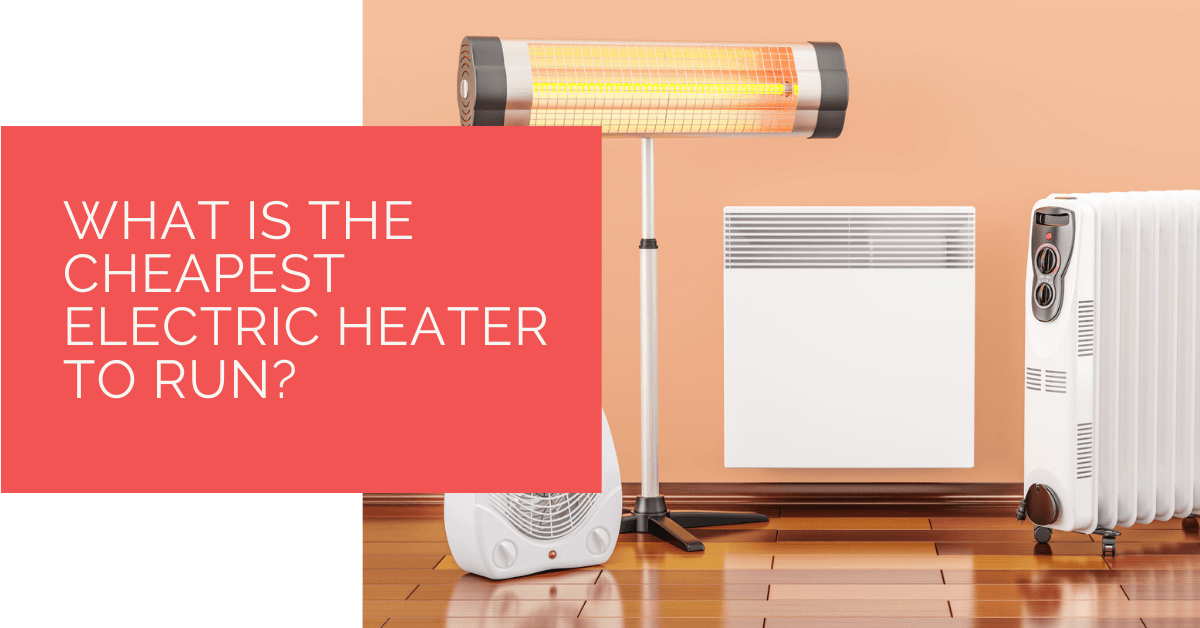Electric heaters become necessary with the temperature going down and cold taking over. While you might think investing in electric heaters could be costly, we are here to surprise you! Many electric heaters are cheap with low energy usage.
An energy-efficient heater is both a bliss for the environment and your pockets. Electric heaters or space heaters are the perfect way to heat a small room in your home. So, you can say goodbye to the central heating system and say yes to the new electric heater.
These days, you can even buy electric stove heaters. That’s how quickly electric heating is taking the forefront. This article will discuss the energy expenditure through electric heaters, various types of electric heaters, and finally, the cheapest electric heater ever.
Contents
- 1 Key Takeaways
- 2 How Does an Electric Heater Work?
- 3 What Are the Costs of Running an Electric Heater?
- 4 Electric Heater Cost Calculator
- 5 Which Is the Cheapest Electric Heater to Run?
- 6 Halogen Heaters
- 7 Fan Heaters
- 8 Convection Heaters
- 9 Storage heaters
- 10 Oil Filled Radiators
- 11 Infrared Heaters
- 12 Heat Pump Source: Reliable Heating and Cooling Solutions
- 13 Wrapping Up
Key Takeaways
- Electric heaters can be cost-effective with low energy usage, making them an efficient way to heat small rooms and potentially replace central heating systems.
- The cost of running an electric heater can be calculated by multiplying the heater’s kW output by the electricity rate, providing the cost per hour of operation.
- Different electric heaters are available, including halogen heaters, fan heaters, convection heaters, storage heaters, oil-filled radiators, and infrared heaters, each with varying running costs and suitability for specific room sizes and heating needs.
How Does an Electric Heater Work?
When you switch an electric heater to run, the electric current passes through the metal alloys. The metal alloy wires create a continuous loop of electric current since they are coiled. These coiled metal alloy wires have been named resistors.
These resistors are based on the concept of the Joule heating system. When the electric current passes through these resistors and is altered into heat energy, this is referred to as Joule heating. The heat is then transported from one point junction to the other.
The majority of these resistors have been built of nichrome wires since they make for excellent resistors. Because of these resistors, the electric heater is referred to as the resistance heating unit. You didn’t know that, did you?
After this, the resistors work in order to dissipate heat. They are generally insulated with either protective materials or regular glass. You might also find fins attached to these metal alloys. Fins help in increasing the surface area of the flowing electric current.
This increase, thus, results in a greater amount of heat being eventually dissipated.
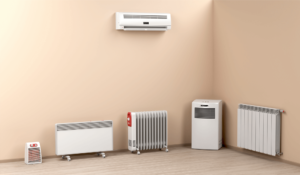
What Are the Costs of Running an Electric Heater?
If you want to figure out, the cost of running your electric heater, there are two simple steps to go about it. You would require:
- the kW output of your electric heater
- Your kilowatt-hour electricity rate on the current energy tariff such as 15p
For instance, let us imagine that you are on 15p per kWh of electricity on the current tariff, and the electric heater has a 1 kW output. Below mentioned is the entire cost of operation.
Electric Heater Cost Calculator
So, as we start calculating the total costs, you will have to multiply 1 (kW output from the heater) multiplied by 15p (kWh charge from the electricity supplier) which equals 15p per hour
You can work out the costs according to different scenarios such as:
- 7.5p for 30 minutes
- £1.50 for 10 hours running time
- £3.00 for 10 hours running time with a larger 2kW electric heater
- If you use a 2kW heater at half capacity i.e. 1kW on the thermostatic control, it will utilize 15p per hour. On the other hand, the electric heater will use 30p per hour on the highest 2kW setting
kW output of your heater multiplied by the cost of your tariff (per kWh) equates to the total cost of running the electric heater every hour
Which Is the Cheapest Electric Heater to Run?
If you want to select a particular electric heater for you, you must determine which product will be the most effective and economical to run. There are multiple electric heaters available for different spaces and scenarios. Electric Panel heaters are a big category and there are an array of subdomains depending on the technology used.
The most common electric heater types in the United Kingdom are as follows:
- Convection heaters
- Fan Heaters
- Halogen heaters
- Storage heaters
- Oil filled radiators
Let us now look at some of these popular categories of space heaters in detail along with their running costs.
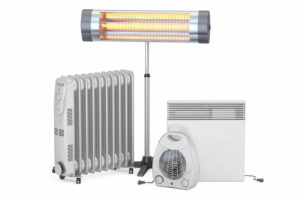
Halogen Heaters
It is a space heater that provides instant heat. They have been named after the halogen element present in the bulb or the lamp. This element when clubbed with electricity heats up and then radiates heat.
Radiant heat refers to the halogen heaters heating up the area which is right in front of them. This is a great pick if you want a fast influx of heat and you do not want to heat the whole room equally.
By a rule of thumb, a Halogen heater is pretty inexpensive when compared to most electric heaters. Their average power output is about 1200W and since they give warm air at limited quarters, it is best to not leave them on for long spans.
Halogen Heater Running Cost
Since you would need a heater with a lower wattage, Halogen heaters are significantly cheap to buy and manage. You can not use them as a central heating system and that is one of the main reasons behind low running costs
Running Cost: £0.20 / hour
Average Wattage: 1200 W
Average Price: £19.99 – £29.99
Fan Heaters
If you have a relatively small room that needs to be heated, fan heaters are your best bet. In these heaters, cool air enters the setup from the back. This cool air passes over the heating element and is then blown out in the front through the internal fan.
Since fan heaters have a unique nature, the warm air which is blown out of the portable electric heater reaches a further distance faster than other modern space heaters. So, these energy-efficient heaters can very quickly heat up a room.
The only negative of using a fan heater is that they produce a lot of noise during operation. These heaters usually have thermostatic control.
Fan Heater Running Cost
A strong suggestion if you are buying a fan heater or already have one is to shut everything up! Ensure all the windows and doors in the room are closed and the chimney is blocked. Through this method, your room will experience long-lasting heat even after these portable electric heaters have been switched off. Moreover, the fan heater running cost and energy bills will be reduced.
Average Price: £19.99
Average wattage: 2000 W
Running Cost: £0.33 / hour
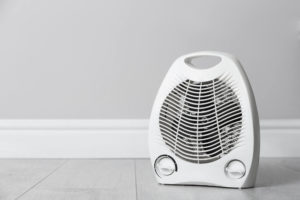
Convection Heaters
If you want a portable heater f a small medium-sized room that distribute heat evenly, Convection heaters should be your choice. Unlike other heaters, this convection heater or portable heaters are based on the process of convection wherein the warm air simply rises whereas the cold air sinks.
This cold is sucked right at the bottom of the convector heater. It then travels through the heating element, which warms the air and leaves the convector heater to run through the top.
Compares to halogen heaters, convector heaters take more time until you actually feel the hot air. The positive of this portable heater is that the heat distribution is even. Generally, the convector heaters have a 2000W power output which is the main reason behind their high prices.
One of the best electric heaters, they have a built-in thermostat control. What does this mean? Thermostat control in convection heaters means that the users can control the heater’s heat output and power setter. So, all in all, this right heater becomes very efficient to use in the longer run.
You would also have to leave the convector heater turned on for a long time to reach the desired temperature. More so, if you compare it to radiant portable heaters.
Convection Heater Running Costs
Now comes, the main question, what is the heating bill going to be for this small heater. Well, with the energy efficiency that this heater offers, you also get moderate pricing and running costs.
Average Price: £14.99 – £24.99
Average wattage: 2000 W
Running Cost: £0.33 / hour
Storage heaters
A storage heater is one of the best electric heater in the United Kingdom market. The main difference in working for this space heater is that it works on an Economy 7/10 tariff system. Additionally, you can forget to travel with these heaters because they are not portable.
Economy 7/Economy 10 in a storage heater is dependent on baseload energy regeneration, which is carried out through technologies that and overtaken by many novel energy generation methods in the UK. So, the tariff basis which allows the storage heaters to save money, might not even happen in some years down the lane.
The storage heater is bulky, big, really costly to buy, and is on the verge of soon becoming irrelevant. At the same time, this heating system can be inexpensive to run if used in a proper manner. Also, a high-performance storage heater is the only electric heating set up that can improve the EPC rating tremendously.
Storage Heater Running Costs
Average Price: £500 upwards
Average wattage: 3000 W
Running Cost: About 13p per hour for a 2kw heater
Oil Filled Radiators
An oil filled radiator is also meant for providing long-lasting heat. They have a heating thermodynamic oil-filled radiator. When you switch the oil filled heater on, the heating element submerged in the oil heats up. Because of this heat, the oil also starts heating and transfers the heat to oil filled heaters body. Once electric radiators are hot, the room starts warming through convection and heat radiation.
This oil filled radiator has a varying average wattage, so the cost attached with this heating system can differ as well. Most of the oil radiators will come with a thermostatic control which is built in. This will allow you to remote count this energy-efficient heater’s power and heat outter.
Oil filled radiator will retain heat so much more than other heaters. The heat in the radiator will be radiated for a short time span even after it is switched off.
Oil Filled Radiators Running Costs
While we have understood that Oil filled radiator is one of the best electric heater and is energy efficient. Let us see the running costs of maintaining and suing this heating system.
Average Price: £19.99
Average wattage: 1500 W
Running Cost: £0.25 / hour
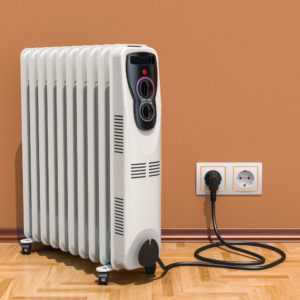
Infrared Heaters
Just like how halogen heaters remove cold air, infrared panels are also based on radiant heat. The technology is rather similar which some tweaks here and there. Halogen heaters use near-infrared technology with very strong and directional heat, the infrared panels are based on far-infrared.
These terms basically mean that infrared panels have a wider dispersal and do not have glowing elements. You can place them on their feet and carry them wherever you like. A suggestion would be that the power output for these heaters is the most when they are ceiling or wall-mounted.
Because these electric heaters don’t actually heat air, they can be used conveniently for old houses and draughty places which would not be able to keep the heat in other scenarios. You should be careful if your house has a lot of glass elements inside. The glass will not be able to handle the infrared heat in the right, so it is best to avoid it.
Infrared Heaters Running Costs
Average Price: £100 upwards
Average Wattage: 1500 W
Running Costs: 7p per hour for a 500w heater to run
Heat Pump Source: Reliable Heating and Cooling Solutions
At Heat Pump Source, we take pride in our unwavering commitment to serving the UK with top-tier HVAC solutions. From the efficiency of heat pumps and the cool relief of air conditioning to the warmth of boilers, radiators, and underfloor heating, our dedicated team is always at the forefront of innovation. We understand the unique needs of every household and business, and we strive to provide dependable health and cooling products and services that are tailored just for you. Ensuring your comfort and satisfaction is our utmost priority. Whether you have questions, need guidance, or require support, we’re always here to assist. Please don’t hesitate to contact us; we’re eager to be of service.
Wrapping Up
So, that’s a wrap, folks! This blog entails all the information you would ever need on electric heaters that are cheap to run and energy-efficient.
If you are particularly interested in buying an inexpensive option, then by all means for a fan heater or a halogen one. You can also look for options with three heat settings: cold, cold air settings and more.
About the Author
At Heat Pump Source, our articles are the product of a collaborative effort among a team of highly skilled HVAC experts. Our dedicated professionals, hailing from diverse backgrounds in heating, ventilation, air conditioning, and refrigeration, contribute their extensive knowledge and experience to every piece of content. This multidisciplinary approach ensures comprehensive coverage. Our commitment is to deliver authoritative, reliable, and tailored advice to meet the unique needs of every household and business across the UK.

